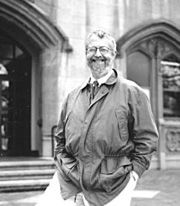Hello! Seattle’s had some significant additions to its theater community in the last few years, from playwrights like August Wilson to artistic directors like Sharon Ott and Gordon Edelstein. But perhaps the biggest name in American theater to arrive is a man whose work will be in the classroom, not on our stages.
Jon Jory founded the Humana Festival of New American Plays in 1979 at the Actors Theater of Louisville, where he served as artistic director. Since that time, Humana has become the major conduit for new plays by American authors onto the regional theater circuit. In fact, since his own Festival work has included involvement with 267 new works, 31 of which he directed in full production, Jory’s probably the single most influential champion of new work in the contemporary American theater. So why’s he coming to UW to teach acting and directing?
When he began to look around for an academic position, Jory found Seattle particularly appealing, and not just because, unlike New York, it was possible to actually live here. Jory was also impressed with not only our plethora of Equity theaters but the amount of experimental companies outside of the mainstream. “This town has a reputation of being a perpetual fringe festival. There’s also some sense outside Seattle of there being a Seattle style, which is strong, quick, and physical, and tied to comedy. I’m afraid I can’t describe it more fully,” he laughs, “because I haven’t had a chance to see much of it yet.”
Jory’s still figuring how he sees his work with the UW students impacting the larger theater community, but he’s looking forward to teaching as a “new way to leave some sort of legacy. The impermanence of theater means you’re always just leaving footsteps in sand. I like the idea of finding new ways to influence the next generation.”
Goodbye! It’s hard to see how anyone could call Fremont’s midsized stage “The Empty Space” while it contained artistic director Eddie Levi Lee. Last month, Lee announced that he had decided to leave the Space in February 2001, the middle of its current season. “I had a lot of fear about leaving,” he admits. “I’m in my late 50s, and the thought of going out again, no work, no prospects was daunting. But I don’t believe in living my life in fear.”
Whether or not Lee’s directly involved in a show (as director, writer, or actor), his larger-than-life presence on opening night has become a trademark at the Space, along with his idiosyncratic vision of theater, summed up in such infamous credos as “there is no show that can’t be improved by fog, full frontal nudity, and a chain saw.”
Lee isn’t interested in being an artistic director again. “I want to go back to being an artist. When you’re in this position, you take it home with you every night. You think about deficits or funders or administrators. I want to wake up in the morning and think about the work.”
He is, however, optimistic about the Space’s future. “I really couldn’t be leaving at a better time,” he says. “The season’s in place, financially we’re pretty good, and departing in February means that I’ll have a chance to work some with the incoming artistic director.”
As to his advice for his successor, Lee reflects for a moment, then chuckles. “Remember, if you’ve been chosen, it’s because they believe you’re a Space sort of person. They knew that about me even though I was 3,000 miles away. You just have to believe you’ve been chosen for a very good reason.”








